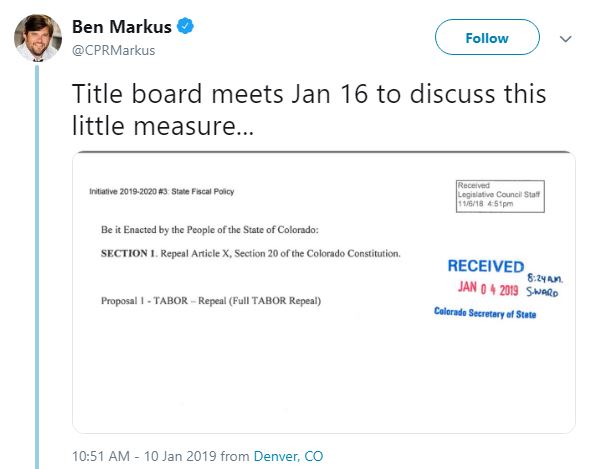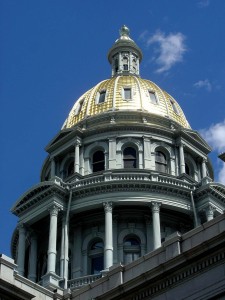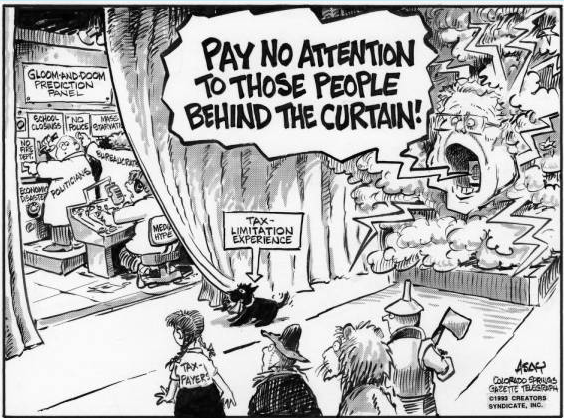
Category Archives: Colorado Legislature
Krista talks with Michael Fields of Colorado Rising Action on TABOR polling
Krista talks with Michael Fields of Colorado Rising Action on TABOR polling
Feb 25, 2019
Click (HERE) to go to KHOW and listen to the interview

THAT’S… A SUPERMAJORITY: 71 Percent of Coloradans Support TABOR
THAT’S… A SUPERMAJORITY: 71 Percent of Coloradans Support TABOR
Well ain’t this something?
A new poll was released indicating overwhelming support of Colorado’s Taxpayer’s Bill of Rights, which most Coloradans lovingly refer to as TABOR. Fully 71 percent of the 500 Coloradans surveyed expressed support for the policy, and lest you think these numbers are skewed, the breakdown of who was asked is… rather reflective of an actual election in Colorado: 37 percent of respondents were either unaffiliated or members of a third party, 32 percent were Democrats, and 31 percent were Republicans.
TABOR, for those uninitiated into wonky public policy, can be defined simply and as follows:
TABOR, the Taxpayer’s Bill of Rights, is an amendment to the state constitution passed in 1992 which requires state and local government to seek voter approval in order to raise taxes and also limits growth in state spending to population growth plus inflation. If the state collects more revenues than it is allowed to spend, then it must return the surplus to the taxpayers.
To put it another way, TABOR allows the people of Colorado to decide amongst themselves on tax increases. It’s one of the most publicly-empowering policies in the entire country, and, yeah, it’s pretty freakin’ popular in our beloved state.
Remember this when Democrats at the State Capitol introduce legislation that either puts a dent in, or otherwise seeks to circumvent TABOR. Every time they do it (and trust us, they do it), Democrat lawmakers are implicitly telling us that we’re not smart enough to determine our own state’s financial future.
For our part, we trust your gut on TABOR. And you’ll be happy to know that you’ve got a lot more friends than foes.
THAT’S… A SUPERMAJORITY: 71 Percent of Coloradans Support TABOR
TABOR needs your help!
Both The TABOR Foundation and TABOR Committee have received huge numbers of requests for assistance and participation.
Your Colorado TABOR team is overwhelmed!
We need your help!
Would you be willing to assist us?
- Be a media producer! Create six podcasts in 2019
- A person to take charge of strategy, tactics, planning, coordination, and management
- We need someone with great perseverance and tenacious determination to assist in generating invitations for TABOR speakers
- Monitoring the Family Leave Act bill: This idea probably will be the next direct attack on TABOR. Some volunteer needs to stay on top of developments
You can make a big difference by volunteering your skills and activism.
Contact us and let’s talk.
Either email TheTABORFoundation@gmail.com or call Penn at his office (303-233-7731).

Thank you for any help you can provide!
Your TABOR Foundation and TABOR Committee team
Read below to see if you can provide any help!
- Podcasts
Be a media producer! The TABOR Foundation’s mission includes outreach to people who have not heard about the Taxpayer’s Bill of Rights and to supporters who want more intellectual ammunition to talk about TABOR. At one point, we had the facility, the interview talent and eight guests scheduled. A technical barrier to posting our podcasts then took some time to overcome. We would like to proceed, but now, for want of leadership and management, we have been unable to move forward. Please help us solve that problem and continue the program.
Requirements: We seek a volunteer who in 2019 will donate about 40 hours between now and early November. The time demands most likely would be in “spurts,” that is, six different projects in which about six hours of your time would be needed over the course of about three weeks, with breaks in between during which little or no time would be asked. The individual we seek has to be well organized and able to gently but persistently move other volunteers to act. You would get to know the people who supply both the taping equipment and the interview skills. For each podcast, you would coordinate the schedule to bring together the person to be interviewed, the taping technician and the interviewer. You would obtain in advance from the Foundation the questions that should guide the interview. You would attend the interview and address any problems. You would work with others or on your own to edit the podcasts for content and flow, with the help of the taping technician. You would coordinate with the web master to post the completed podcast. You would solicit other advocacy groups to link to the podcast and notify other media of its availability. Throughout the year you would report to, and keep apprised, the Foundation’s Executive Director.
- Speakers Bureau – Communications
The TABOR Foundation needs to replace an activist who has excellent skills in defining the TABOR outreach message but must relinquish that role. She also has been organizing the resources necessary for successful presentations.
Requirements: A volunteer who in 2019 will donate an average of one to two hours a week to manage the Speakers Bureau and continue to weigh political developments and reactions to keep the speakers group prepared. There is also a need to organize one-time training sessions to improve the preparation of speakers. One training session would be for TABOR content, delivered by an experienced TABOR speaker. A second session would be to hone the speakers’ presentation skills, to be led by a professional trainer. Time would also have to be given to ensure consistent promotion is ongoing.
- Speakers Bureau – Outreach
There are more speakers ready to make more TABOR 101 presentations than we have venues to deliver the message. One person has been active in soliciting invitations, but needs assistance. The TABOR Foundation needs another person to call political clubs and civic clubs along the Front Range, and perhaps eventually to expand into other areas of the state. The objective would be to generate four invitations per month, which then would have to match the invitation with an available speaker and communicate the key logistical information and coordinate use of the PowerPoint equipment. The individual doing this work needs to be a self-starter with a commitment to keep after the goals, in what often proves to be a frustrating and drawn-out effort to identify program directors, ensure that duplicative calls are not going out in conflict with the other caller, and the need to recruit the best person to speak from our portfolio of volunteers.
- Monitor Family Leave Bill
Rumor has the TABOR Committee expecting that a new 1% payroll tax will be called something else by the legislature, so no voter approval will be allowed. Learn how to track the introduction of new bills throughout the session (or exercise your knowledge if already familiar). Once introduced, notify the Committee and keep us apprised of the progress of the legislation – when people can testify, revisions to the fiscal note, and so on. Very likely there will be additional collaboration / coordination with other groups concerned about the bill. A wild guess is that tracking will take 15 minutes a day until the bill dies, is passed, or session ends in May. Additional communication may take one or two dozen hours. A related task would be to generate guest columns in several major newspapers, a task that could double the time you contribute.
Taxpayer’s Bill of Rights should be strengthened, not repealed
Taxpayer’s Bill of Rights should be strengthened, not repealed
JAY STOOKSBERRY

On Jan. 15, a briefly worded initiative was presented to the Colorado Title Board for consideration to be placed on the 2020 ballot. The brevity of the proposal was commendable. Five words was all it needed: “TABOR – Repeal (Full TABOR Repeal).” Though speculative at this point, defenders of Article X Section 20 of the Colorado Constitution — better known as the Taxpayer’s Bill of Rights (TABOR) — should prepare for a fight in 2020.
Well before TABOR became law in 1992, opponents concocted every possible scenario as to how this new constitutional amendment would lead to fiscal armageddon in Colorado. Nearly three decades after its passing, most of this hyperbole — as is the case for most hyperbole — never materialized.
Where is Colorado from a fiscal perspective? According to the States Project, Colorado ranks 30th in the country for total state debt (including unfunded liabilities) as a percentage of gross state product. The Mercatus Center ranks our state as 28th in the nation regarding a combination of solvency for cash, budget, long-run spending, service-level flexibility, and unfunded liabilities. U.S. News ranked Colorado 31st in fiscal stability.
It would seem Colorado is middle of the pack at best. TABOR did not ruin our state’s ability to manage the general fund.
Contrary to popular wisdom of the Chicken Littles who warned about how damaging it would be to Colorado, TABOR doesn’t need to be repealed; it needs to be strengthened. Continue reading
Possible repeal of Taxpayer’s Bill of Rights to get rehearing
Possible repeal of Taxpayer’s Bill of Rights to get rehearing
January 28, 2019 By Sherrie Peif
DENVER — Two Denver residents behind a proposed ballot initiative to repeal the Taxpayer’s Bill of Rights (TABOR) have filed for a rehearing after the Colorado Title Board initially rejected their proposal.
On Jan. 16, the Title Board denied setting a title on an initiative that would ask voters to repeal the 26-year-old constitutional amendment that requires voter approval to increase taxes or take on new debt. TABOR also limits the growth of a portion of the state budget to a formula of population growth plus inflation. The board said the initiative violated Colorado’s single subject rule.
Board member LeeAnn Morrill, who represented the Attorney General’s office, cited a Supreme Court decision over a 2002 proposed initiative that included a provision preventing the complete repeal of TABOR. She pointed out that the court stated in its decision: Continue reading
TABOR Committee presents to the Japan Local Government Center
TABOR Committee presents to the Japan Local Government Center
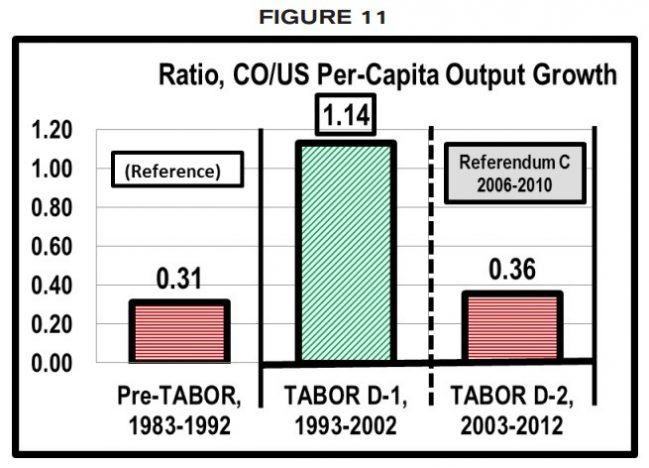

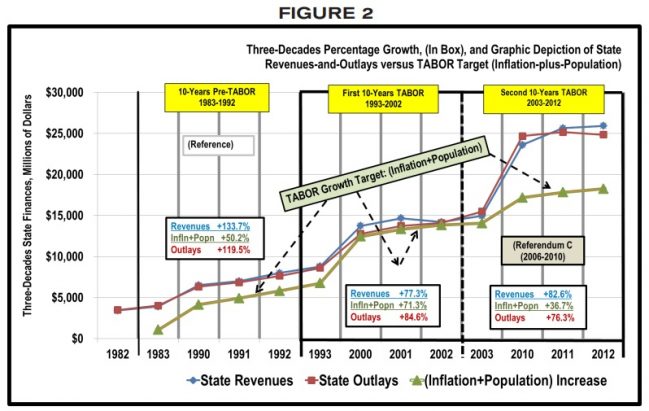
On January 16, 2019 two representatives of the Japan Local Government Center met with TABOR Committee Chairman Penn Pfiffner to learn what proponents of the Taxpayer’s Bill of Rights know about the positive aspects of fiscal discipline.
The Center has seven offices around the globe that compare and contrast and learn from other countries’ practices. Working out of the New York City office is Ms. Kaori Kurauchi, an official with the Japanese Ministry of Internal Affairs. She was accompanied by Dr. Seth Benjamin, a Senior Researcher in the New York office. Ms. Kurauchi is on a two year assignment to research tax and expenditure limitations and other government fiscal limitations in America and Canada. Continue reading
Colorado Title Board denies attempt to repeal Taxpayer’s Bill of Rights
DENVER — The Colorado Title Board rejected a proposal on Wednesday to put a full repeal of the Taxpayer’s Bill of Rights (TABOR) before voters in a future election.
The board voted 3-0 that the proposal violated the single subject rule and the board did not have jurisdiction to set a ballot title.
 Proponents Carol Hedges and Steve Briggs had an initial hearing before the Title Board at 1 p.m. on Wednesday. Although voters several years ago passed new rules that make adding an amendment to Colorado’s constitution harder, it still only takes a simple majority to repeal an amendment.
Proponents Carol Hedges and Steve Briggs had an initial hearing before the Title Board at 1 p.m. on Wednesday. Although voters several years ago passed new rules that make adding an amendment to Colorado’s constitution harder, it still only takes a simple majority to repeal an amendment.
Denver-based attorney Edward Ramey, who represented the proponents, said the proposal was to do “one thing and one thing only.”
“That’s to repeal Article X, Section 20 of the Constitution,” Ramey told the board. “I emphasize that because we’re not adding anything to it. We’re not trying to tweak anything. We’re not repealing and ellipsis doing anything. This is just a straight repeal.”
Ramey said the single subject debate keeps coming up because the consensus is TABOR itself contains more than one subject, but he disagreed with those findings. He cited a couple of Colorado Supreme Court rulings that addressed the subject in a manner that he believed favored his clients in this case. Continue reading
Effort launched to repeal Taxpayer’s Bill of Rights
Effort launched to repeal Taxpayer’s Bill of Rights; possible ballot issue before the Title Board

DENVER — On the same day Democrats were sworn into all the top elected offices in Colorado, new Secretary of State Jena Griswold announced one of the first potential state-wide ballot initiatives to go before the Colorado Title Board will be a complete repeal of the Taxpayer’s Bill of Rights (TABOR).
The Title Board is the first step in putting a citizen-initiated question before voters.
TABOR is a constitutional amendment that was passed by voters in 1992 that requires voter approval to increase taxes or take on new debt. It also limits the growth of a portion of the state budget to a formula of population growth plus inflation. It has been a controversial topic since its inception, and it’s been debated in the courts numerous times.
Many Democrats say it is a threat to Colorado’s education, transportation and health care funding, while Republicans counter that it is what has allowed the Colorado economy to prosper, as well as allowing Colorado to more easily weather economic downturns than states that lack taxpayer protections such as TABOR.
Many attempts to repeal or tweak portions of the amendment have come before the Title Board. This is the first time, however, that anyone can recall where a full repeal of the amendment has been proposed.
The Colorado Legislature & Title Board Is Trying To Repeal TABOR

